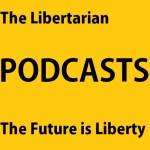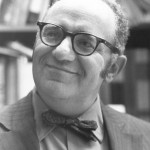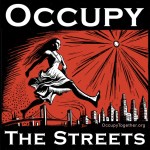Recorded on Friday 2nd August.
The Libertarian: Podcast #1

A Turning Point: US War Collectivism in World War I
Mark Stoval
Any well-read individual would have to agree that the early U.S. was basically a classically liberal state with a nearly laissez-faire outlook on the market. Please note the qualifiers in that sentence; I am well aware that the early U.S. system was not perfect. It was, however, dramatically freer economically than today’s U.S.
There are countless points in history where the people allowed the state to grab more power. But there is one point in history that seems to be the birthing point of the corporatist system that we have now. When did the U.S. make a great leap towards the quasi-fascist system that we have now? According to Murray Rothbard the critical tipping point was World War I:
It was a “war collectivism,” a totally planned economy run largely by big-business interests through the instrumentality of the central government, which served as the model…for state corporate capitalism for the remainder of the twentieth century.
Political Action

By Dean Hyatt
I am writing this in support of political action, but you may not be aware that there are others of the libertarian wing who do not, I especially choose political action because I see the threats and weakness’s to the agorist system and am not confounded by such theories. This article will go a long way of explaining why I resigned from the Conservatives and continue on as a Liberal Democrats (or rather just explains the Tory part). Another reason I want to touch this topic is because I do not accept Rothbard’s attempt at justifying political actions because of the basis he wrote:
“Konkin’s entire theory speaks only to the interests and concerns of the marginal classes who are self-employed. The great bulk of the people are full-time wage workers; they are people with steady jobs. Konkinism has nothing whatsoever to say to these people. To adopt Konkin’s strategy, then, would on this ground alone, serve up a dead end for the libertarian movement. We cannot win if there is no possibility of speaking to the concerns of the great bulk of wage earners in this and other countries.” – Murray Rothbard
Murray Rothbard in 10 Great Quotes

The ‘Great Authors in 10 Quotes’ is an ongoing series meant to expose libertarian-leaning readership with some of the most noteworthy thinkers in the classical liberal, libertarian, and anarchist traditions. The challenge is finding material deep enough to reflect an author’s thought, while still being accessible for a brand new reader. We encourage readers to leave comments linking to other written works and videos by the author.
Murray Newton Rothbard (1926 -1995) was the single most influential figure of the post-WWII American libertarian movement. Rothbard synthesized concepts from Austrian economics, classical liberalism, individualist anarchism, and other sources to codify much of the thought underlying contemporary libertarianism. Rothbard was a student of Austrian School economist Ludwig von Mises and former associate of libertarian intellectuals such as Ayn Rand and Karl Hess. Rothbard published more than 20 works on libertarian topics ranging from economics, to history, to proposals for social activism.
Government Still the Problem

Mark Stoval
I once read a quote that summed up the problem with the Occupy Wall Street movement very well. It went something like this: “Blaming Wall Street for controlling Congress is like blaming the other woman for controlling a cheating husband.” So many on the left (and the “occupy” movement in particular) are refusing to look at the real force behind their problems. Large corporations and industries hire lobbyists and throw money around D.C. for a good reason. They do so because they can count on special favors in return. The federal government of the U.S., that is, does not always adhere to the principle of equal treatment under the law.
The “progressives” can not seem to distinguish free-market capitalism from corporatism, and criticize the latter, which is closer to our current system, as if it were the former. But of course, if we truly had a free market, there would be no profit at all in special interest groups lobbying for special treatment, as the government would simply refuse to intervene.
Non-state Alternatives to Nozick’s Night-Watchman

By Jock Coats
In the nearly four decades since Harvard University Professor Robert Nozick wrote what is probably his best known work, “Anarchy, State and Utopia [ASU]” (1974), much of the academic debate it has generated has focussed on its role as a response to fellow Harvard political philosopher John Rawls’s “A Theory of Justice” (1971). This debate, therefore has concentrated on the second of the three distinct parts of ASU in which Nozick advances his own libertarian theory of distributive justice (Vallentyne, 2011) and on his critique of Rawls’s influential liberal, redistributive version (Meadowcroft, 2011). Continue reading
Karl Hess in 10 Great Quotes
By Eric Field
The ‘Great Authors in 10 Quotes’ is an ongoing series meant to expose libertarian-leaning readership with some of the most noteworthy thinkers in the classical liberal, libertarian, and anarchist traditions. The challenge is finding material deep enough to reflect an author’s thought, while still being accessible for a brand new reader. We encourage readers to leave comments linking to other written works and videos by the author.
Karl Hess (1923-1994) was an American political philosopher, libertarian activist, journalist, survivalist, professional welder, and speechwriter for both the Republican and Libertarian parties. Abandoned by his Pilipino colonialist father, he was raised by his strongly Catholic and classical liberal mother in a manner reminiscent to today’s unschooling movement. Hess dropped out of formal schooling at the age of 15 in order to become a professional journalist. Hess wrote the 1960 GOP platform and served as the primary speechwriter during Senator Barry Goldwater’s 1964 presidential bid. Following the purge of many prominent Goldwaterites from GOP leadership after the 1964 defeat, Hess became a libertarian anarchist under the influence of Murray Rothbard.
Spontaneous Emergence of Rules
In my previous article I criticised the Coasian approach to the economic analysis of law. Not only is it incompatible with libertarian philosophy, it even goes against common intuitions. Indeed, when taken seriously by judges, it may have devastating consequences for peaceful cooperation. In the present article I would like to focus attention on the process by which legal rules and institutions evolve and their justification.